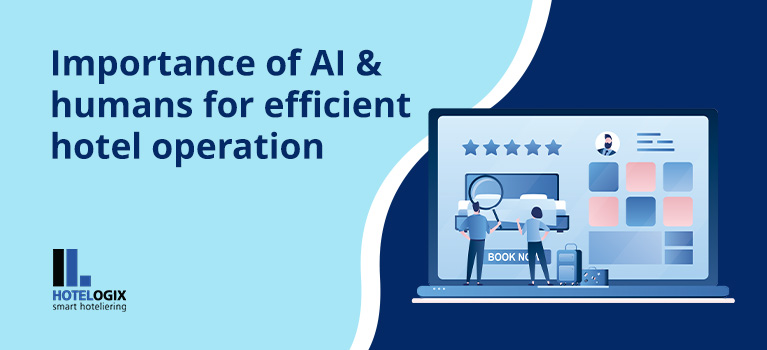
As a technology, Artificial Intelligence (AI) has been around us for decades. But its proliferation and integration into various businesses started very recently with the increase in the computing power of machines, deep learning, advancement in cloud computing, etc. For numerous companies, AI has emerged as a medium to simplify processes, predict sales, and improve overall performance.
How has AI made inroads into hotel operations?
With today’s hotel guests becoming extremely demanding and the business landscape evolving, hotels must gain a competitive edge to stay relevant. It can be possible when they can ensure two things – automating the process and offering personalised services to their guests. And this is where AI-powered hospitality technology solutions come to the scene. Here are a few driving factors that have led to the rapid adoption of AI in the hotel industry – improving operational capabilities, forecasting demand, pricing room rates, boosting revenue, and exceeding guests’ expectations.
AI in guest service
From assisting prospective guests with their queries with a chatbot or guiding in-house guests with a robot, AI has helped hotels in everything. For example, hotels can leverage conversational AI to automate the whole process of guest-facing communications 24/7. It allows hotels to stay in touch with their guests before, during, and after their stay. These AI-powered chatbots can understand the context of conversations and automatically compare them with guests’ past data to provide relevant responses.
AI in revenue management
Yes, we are talking about AI-powered revenue management tools. This is about intelligently selling more rooms at the best price while boosting occupancy and revenues. It gathers the correct data set, identifies patterns and trends, offers insights into future demand, monitors competition pricing and suggests the optimal room rates for the right guest at the right time.
Will AI replace humans in hotels?
A few leading hotel brands have adopted AI-powered robots in concierges to help guests with the required information upon arrival. Plus, we have seen those robots deployed to perform delivery tasks. While this is undoubtedly remarkable, will it replace humans in a hotel?
The answer is NO. For hotels, robots are good-to-have elements to promote themselves as tech-savvy hospitality brands. But it will never replace hotel staff entirely.
Let’s look at it this way – robots don’t possess emotional and social capacity. They can’t offer the “personal touch” that today’s guests need the most. While robots can elevate a hotel’s image as a brand offering contactless services, trained and well-mannered staff are still required to extend the hotel’s brand image and hospitality to guests with a smile and friendly gesture. Let me ask this, can robots smile and greet guests?
Similarly, revenue management is another area of hotel operations with the same doubt. We have heard this – can AI-powered revenue management solutions (RMS) replace human revenue managers? Here too, the answer is NO. A tool can’t displace human intelligence. A hotel still needs a seasoned revenue manager to monitor and make the most of a best-in-class AI-powered RMS tool. Simply put, AI-powered RMSs are rule-driven, learn from instances, and can’t beat human intelligence when dealing with unusual situations.
We need to take a closer look at this topic from a recommendation vs decision-making point of view. For example, intelligent tools can locate trends and suggest what needs to be done. But ultimately, it is up to skilled hotel staff to act or not to act.
Artificial Intelligence + Human Intelligence: The best combination for hotels
Whether in guest-facing operations or other areas, AI has proved its worth. But it will never make skilled hotel staff redundant as they are critical for building relationships and offering assurance in awkward situations. Hotel staff are better equipped with on-the-spot problem-solving skills, which is crucial in the service industry. Most importantly, they both are instrumental in making a hotel more hospitable. A hotel needs a good mix of artificial intelligence and human intelligence to remove all friction points, leading to an efficient, sustainable, and profitable hotel business.
This article was originally published in ET Hospitality World.

